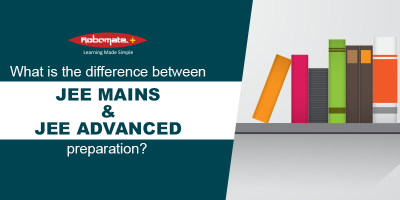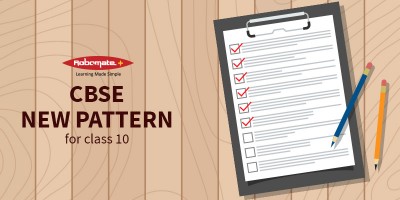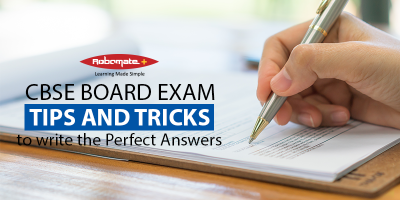State Board Commerce (XI-XII) - Test Papers
What is the difference between JEE MAINS and JEE ADVANCED preparation?
What is the difference between JEE Mains & Advanced preparations? And you know, can you skip some topics for Mains? If you are clear that you want to be aspiring for Advanced. So that’s the question that is being asked.
If you have clearly decided that you are going to appear for JEE Advanced then you can skip few chapters of Main. There is a gap between Boards and Main Exam, so you can cover those chapters during that particular period. No need to focus on those particular chapters before-hand. And you should be preparing in-depth. Because Advanced is more about in-depth knowledge of a particular topic and Main is about practice and coverage of that particular topic. So its formula strengthening and speed. Therefore you need to practice more problems and it is repetitive. Advanced is almost like a fresh paper. Every time you will always get new questions. So, you need to focus in depth for Advanced and practice more for Main.
CBSE New Pattern for Assessment – All You Need to Know
CBSE has announced a CBSE new pattern. The latest policy is all about changes in awarding grades. Here is what you should know about the CBSE new pattern.
The latest policy rolled out by the Central Board of Secondary Education is termed, “Uniform Assessment, Examination and Report Card “.
CBSE system currently follows the grading system in assessment of students. The CBSE new pattern changes from awarding grades to marks.
Evaluation of students’ performance is done based on the written examination. Previously, the final assessment and awarding grades to CBSE students revolved around performances in the class tests, periodic assessments, submissions of notebooks and records, and enrichment activity in the subjects. The context of the CBSE new pattern assessment scheme is to impart uniformity in CBSE pattern examination in all CBSE schools, across the country. Towards initiating the CBSE new pattern in assessment, the CBSE board issued a report card format along with this notification circular.
CBSE new pattern also has a few key features not to ignore. Let us take a brief outlook.
Key Elements of the CBSE New Pattern Assessment
- Assessment Parameters
- Examination Pattern and Weight-age
Assessment parameters
The CBSE new pattern guidelines throws light on the assessment parameters for evaluation of the student’s performance.
- For scholastic performances, the board awards both grades and marks on individual subjects.
- For co-scholastic performances, the board awards grades to the students under three categories – Prevocational education, health and physical education, and art education.
- As a third category, discipline in the school campus is awarded as grades. The evaluation category involves discipline with respect of behavior, ethics and values, sincerity, and attendance.
Examination Pattern and Weight-age
The pattern of examination changes periodically by the board. The CBSE new pattern marks the following changes in the same.
The assessment pattern of Class 10 applies to the Class 9 by the CBSE board. The CBSE new pattern of class 9 examination has been changed to a year end exam. Each subject has a total of 100 marks, where 80 marks is assigned toward written examination and 20 marks as internal assessment. The internal assessment marks has three disciplines,
- 10 marks periodic tests
- 5 marks for notebook submission and
- 5 marks for enrichment activity of all subjects
There are no changes in the assessment format for Classes 6 to 8. Yet, the CBSE new pattern has made changes in the number of term exams. Students from classes 6 to 8 have to appear twice in term exams.
- The board conducts exam at the end of each term
- The exam is set based on the syllabus covered during each terms
- For term 2 exam, it includes a percentage of questions from term 1 syllabus
Are there any Benefits in the CBSE New Pattern?
We have seen the changes in the CBSE new pattern, the assessment mode, changes in exam pattern, weight-age, etc. Does it bring any benefits?
Easy migration for parents and students
When the assessment system is uniform, it is certainly beneficial for students as well as the parents. It is easy for the students to follow the system in any CBSE school across the country. Parents with the transferable jobs can easily migrate from one school to another.
Marking System always sounds better
On any given day, marking system followed in schools sounds better than the grading system. Grades collectively indicate the performance of the students. In marking system, the students get a solid idea about what they lag and how they perform. It will motivate students to work hard.
Prepare the students for higher secondary
The major benefit of the CBSE new pattern in assessment and examination is it prepares the students for hard work. Many students face difficulty and pressure in handling heavy subjects in the higher secondary i.e classes 11 and 12. The CBSE new pattern system equips the students to prepare well and face the heavy academic load in the future years.

Challenges the Parents may Face
The CBSE new pattern is likely to pose a little challenge to the parents. Parents have the responsibility to help their children and support them to accept this transition without many hassles. If you are unsure how to help your child, read on a few tips.
- Take part in the orientation sessions of your child’s school without fail. If not possible, periodically interact with your child’s teacher and school management to stay updated.
- Support and encourage your child by detailing the positive elements of the CBSE new pattern. While the child may easy clear the high school, it becomes difficult in higher classes. Highlight the fact that the CBSE new pattern is likely to prepare them for rigorous academics, which prevents them from future sufferings.
- Develop the habit of daily study. Say a big NO to procrastination.
- Monitor the performance of your child. Mere academics performance is not enough. You should focus on co-scholastic and disciplinary areas to.
- Talk and discuss with the teachers to evaluate the progress.
Every new pattern has its own advantages and disadvantages. The CBSE new pattern has a fair share of benefits to the students, considering their future.
CBSE Board Exam Tips and tricks to write the Perfect Answers
Series of tips and tricks are being given to students appearing for the CBSE board exams. All this information could be detrimental to the student’s preparation. Students shoulder lots of hopes of their parents, teachers and society around. This pressure, either works in favor or against in case of some brilliant students; depending on their mental abilities. Here are some useful tips and tricks to handle the internal and external challenges while facing CBSE board exams.
How to approach CBSE board exams?
There are many rules for writing answers in CBSE board exams. Majority of the students have lots of information on every topic in their syllabus. But they aren’t able to sort that information into logical text, thereby ending up with the answers that are left wanting. All preparations will go in vain if a student is not able to perform well on the day of the CBSE board exam.
Here are some useful tips that will help you to plan and execute effectively in order to score maximum marks in your CBSE Board exams:
1. Set your priorities straight
As soon as you get the CBSE Exam question paper, make a list of the questions you feel are easy and attempt them first. This will help you gain confidence and will also spare you enough time to think about the other tougher questions. These should be attempted in the ascending order of difficulty.
Few questions in the paper are choice based. Student shouldn’t be in a hurry to choose which questions to attempt. Each question should be read twice and eventually a decision should be made on what to attempt and what to exclude.
2. Answers should be comprehensive and succinct:
Unwanted information while answering should be avoided. Lengthy answers do not translate to maximum scores. Always keep in mind that you have to impress examiner; not yourself!
Here are some perfect tips and tricks in order to write an innovative and smart answer:
- Begin your answer with the core idea of the topic
- Enrich your answer by adding examples, theories, figures and quotes
- Coherent flow of the information should be maintained
- Answer should be well summarized by concluding lines.
3. Use simple language and avoid decorations
As English is the medium of instruction in most of the CBSE Board Schools, it is imperative to know how to write in simple and clear English. Subjects such as Geography, History and Science that have difficult to memorize jargon need to be written in exact/proper words. Using of an academic style of writing with little flavor added in the language grabs the interest of the evaluator. Novels, magazine, few newspapers and most websites use the least complicated language in order to connect with audiences instantly. A student needs to do the same.
Remember to avoid heavy language and try to explain the concepts in your own words.
Although presentation is key, there is no need to decorate answers with multiple colours. Students tend to use blue, green and black coloured pens for headings and underlining each one of them to please the examiner. Examiner will only be impressed by the content; not by the colourful presentation. This practice will not help you to gain any extra marks but will definitely take away your precious time which you could have utilized in answering questions. Neat and legible writing will suffice to maximize your marks in your CBSE Board exams.
4. Avoid using contractions
Do not use contractions such as didn’t, wouldn’t, couldn’t and should’ve in your answers. Use their full forms like did not, would not, could not or should have.
For Example:
Incorrect: I won’t be able to attend the meeting.
Correct: I will not able to attend the meeting.
5. Write Fact-based answers in Passive Voice
Always write in passive voice whenever you write long answers in the form of experiments or the step-by-step procedures in your science practical. Use of passive voice is more academic and appropriate.
6. Use appropriate single word instead of phrases
Students should practice to increase their vocabulary. Don’t stretch your answer using a bunch of words. The answer should be framed concisely. The perfect single word alternative is more impressive than the phrases. It would be definitely helpful to fetch more marks in your CBSE Board Exam.
For Example:
Incorrect: Ramesh always believes in a fate.
Correct: Ramesh is a fatalist.
7. Avoid Spoken English slangs and instant messaging styles while writing answers
Do not use ‘shud’ and ‘woud’ instead of should and would, respectively. Also, written English is different from spoken English. Using filler words in speech may be overlooked but using words such as ‘like’ in answers will be detrimental to maximizing your score.
8. Manage Time Effectively
It is advised that students appearing for CBSE board exams manage their time effectively and efficiently. You may know all the answers but what matters is how many you complete. It is ideal to devote your last 10 minutes for cross-checking of your answers. Rechecking to make your answer fool proof could fetch you more marks than attempting to answer a difficult question at the end.









